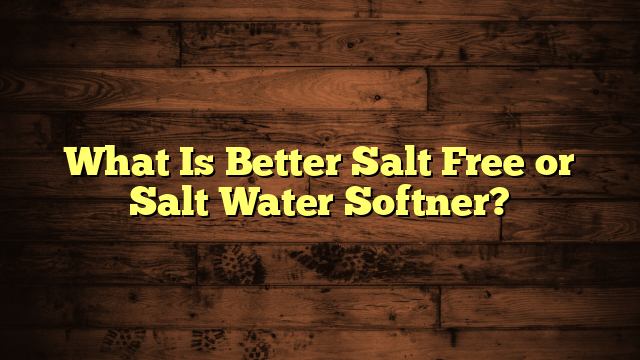What Is Better Salt Free or Salt Water Softner?
When you compare salt water softeners to salt-free alternatives, you'll find a spectrum of benefits and drawbacks that can greatly impact your lifestyle. Salt water systems often deliver quick results in hardness reduction, yet they demand consistent maintenance and can elevate sodium levels in your water. On the other hand, salt-free systems promise a healthier profile and lower upkeep costs but may take longer to condition your water. So, which choice aligns better with your health needs and environmental values? Exploring these nuances could help you make a more informed decision.
Key Takeaways
- Salt-based water softeners provide immediate hardness reduction but require regular salt replenishment and maintenance.
- Salt-free systems condition water over time, preventing scale buildup while maintaining beneficial minerals with less upkeep.
- Salt water softeners increase sodium levels, which can be problematic for individuals with hypertension, while salt-free systems do not.
- Operating costs for salt water systems are higher due to frequent salt refills, whereas salt-free systems have lower long-term maintenance expenses.
- Consider personal health concerns, lifestyle preferences, and environmental impact when choosing between salt-based and salt-free systems.
Overview of Water Softeners
When it comes to managing hard water, many homeowners find themselves considering various options for water softening. Water hardness primarily results from high levels of calcium and magnesium. These minerals can lead to scale buildup in pipes and appliances, affecting their efficiency and lifespan.
Understanding the different softening methods available can help you make an informed decision for your home.
Water softeners typically fall into two categories: salt-based and salt-free systems. Salt-based water softeners use ion exchange to replace hard minerals with sodium ions, effectively reducing water hardness. This method is highly effective and widely used, but it does introduce sodium into your water supply, which may be a concern for some households.
On the other hand, salt-free systems employ various techniques, such as template-assisted crystallization or catalytic media, to prevent scale formation without removing minerals from the water.
While these systems don't technically soften water, they can minimize the effects of hard water on your plumbing and appliances.
How Salt Water Softeners Work
Salt water softeners operate through a process known as ion exchange, where hard water passes through a resin bed saturated with sodium ions. As hard water, which contains minerals like calcium and magnesium, flows through this resin, the sodium ions are released while the unwanted minerals are captured. This exchange effectively reduces the hardness of the water, making it more suitable for household use.
After a period of operation, the resin bed becomes saturated with these hardness minerals and can no longer soften water efficiently. To regenerate the resin, you need to use a brine solution, which is a mixture of water and salt. The brine solution is introduced into the system, allowing the high concentration of sodium ions to displace the captured calcium and magnesium ions from the resin. This process restores the resin's effectiveness, preparing it for continued use.
It's crucial to monitor the salt levels in your brine tank, as insufficient salt can hinder the regeneration process.
Regular maintenance guarantees that your salt water softener functions effectively, providing you with soft water consistently.
How Salt-Free Softeners Work
Utilizing a different approach compared to traditional salt water softeners, salt-free softeners employ a process called Template Assisted Crystallization (TAC) to treat hard water.
This innovative method leverages polymer technology to facilitate mineral replacement, effectively transforming problematic minerals like calcium and magnesium into harmless crystals.
In a salt-free system, the water flows through a specialized medium that contains polymers.
These polymers attract the hardness minerals and encourage them to form microscopic crystals.
Instead of removing these minerals as traditional softeners do, TAC prevents them from adhering to surfaces, such as pipes and appliances, reducing scaling and buildup.
Since salt-free softeners don't remove minerals from the water, they maintain beneficial elements that are often essential for health.
Furthermore, this approach requires minimal maintenance and doesn't involve the use of salts, making it environmentally friendly.
Effectiveness in Hard Water Treatment
When choosing between salt-free and saltwater softeners, understanding their effectiveness in treating hard water is essential.
You'll want to contemplate how efficiently each system removes hardness minerals, prevents scale buildup, and impacts maintenance and system longevity.
Evaluating these factors will help you make an informed decision that best suits your needs.
Hard Water Removal Efficiency
Choosing between a salt-free and a salt water softener often boils down to their hard water removal efficiency.
Salt water softeners utilize ion exchange removal techniques, effectively eliminating calcium and magnesium ions that create hard water problems. They can greatly reduce hardness levels, providing you with softer water for everyday use.
On the other hand, salt-free softeners employ a different approach, conditioning the hard water rather than removing these minerals. This process can lead to varying results depending on your specific water composition.
Here are some key points to take into account:
- Immediate hardness reduction: Salt water softeners offer rapid results, making water feel noticeably softer right away.
- Long-term conditioning: Salt-free systems may require time to show benefits, as they alter the structure of minerals instead of removing them.
- Maintenance demands: Salt water systems need regular salt replenishment, while salt-free systems typically have lower maintenance needs.
Ultimately, your choice will depend on your specific hard water challenges and your preference for removal techniques.
Weigh these factors carefully to find the ideal solution for your home.
Scale Buildup Prevention
Scale buildup can greatly impact your plumbing and appliances, making effective prevention essential in hard water treatment. When you use hard water, minerals like calcium and magnesium can accumulate, leading to clogs and decreased efficiency in your systems.
To combat this, you need to understand the prevention methods available through both salt-free and saltwater softeners.
Saltwater softeners work by exchanging sodium ions for calcium and magnesium, effectively reducing scale buildup in your plumbing. However, they require regular maintenance and salt replenishment.
On the other hand, salt-free systems utilize a process called template-assisted crystallization. This method prevents mineral buildup by converting hard minerals into a more manageable form that doesn't stick to surfaces.
While both systems can reduce scale buildup, their effectiveness varies based on your specific water conditions. If you want a lower-maintenance option, a salt-free system might be ideal.
However, if you prefer a more aggressive approach to scale prevention, a saltwater softener may be your best bet. Ultimately, evaluating your needs and installation environment will help you choose the right prevention method for effective hard water treatment.
Maintenance and Longevity
Understanding the maintenance requirements of your chosen water softener is key to guaranteeing its longevity and effectiveness in treating hard water. Both salt-free and salt-based systems have distinct maintenance needs that you'll want to take into account for peak performance.
- Regularly check and replace filters to prevent clogging.
- Monitor salt levels in salt-based systems to avoid inefficiencies.
- Inspect resin beads for degradation, which can affect water quality.
For salt-based softeners, the maintenance frequency typically involves replenishing salt every few weeks, which directly impacts the system lifespan. Neglecting this can lead to reduced efficiency in treating hard water.
On the other hand, salt-free systems generally require less frequent maintenance, yet they still need periodic inspections to verify the conditioning media remains effective.
Ultimately, how well you maintain your water softener will determine its durability and performance. Regular upkeep not only extends the system lifespan but also guarantees you continue to enjoy the benefits of softened water.
Maintenance and Operating Costs
Maintaining an efficient water softening system hinges on the balance of operating costs and upkeep. When considering salt-free versus salt water softeners, you'll notice differences in both maintenance frequency and operating expenses that can greatly impact your budget.
Salt water softeners generally require more frequent maintenance, including regular salt refills and occasional system cleaning. These added steps can lead to higher operating expenses over time.
In contrast, salt-free systems typically need less hands-on attention, as they don't rely on salt. This means fewer interruptions for you, translating to lower ongoing costs.
However, keep in mind that while salt-free systems have lower maintenance frequency, their initial installation costs can vary. You may find that a salt water system might've cheaper upfront costs but could lead to higher long-term expenses due to the need for salt and maintenance.
Ultimately, evaluating your priorities—whether it's the peace of mind from less frequent maintenance or managing your budget for ongoing operating expenses—will guide you in making the right choice for your water softening needs.
Health Considerations
When it comes to your health, the choice between salt-free and salt water softeners can have significant implications. One of the primary concerns is sodium intake. If you opt for a salt water softener, you'll be adding sodium to your water supply. For those monitoring their sodium levels—especially individuals with hypertension or cardiovascular health issues—this can be problematic.
On the other hand, salt-free systems utilize a different method to soften water, which doesn't introduce additional sodium. This can be beneficial for:
- Reducing your risk of high blood pressure: Lower sodium levels in your water can contribute to better cardiovascular health.
- Minimizing kidney strain: With less sodium in your diet, your kidneys can function more efficiently.
- Supporting overall wellness: A balanced sodium intake helps maintain bodily functions without overloading your system.
Ultimately, your choice should align with your health needs. If you're managing cardiovascular health or are sensitive to sodium, a salt-free softener may be a more prudent option.
Always consider consulting a healthcare professional to determine what's best for your specific circumstances.
Environmental Impact
The choice between salt-free and salt water softeners also carries important environmental implications. When you opt for a salt water softener, you introduce sodium into the water supply, which can lead to increased water pollution. This added sodium can disrupt local ecosystems, impacting both plant and animal life. Elevated sodium levels in freshwater sources can be detrimental to aquatic organisms, altering their habitats and reducing biodiversity.
On the other hand, salt-free softeners utilize a different technology, often involving a process called template-assisted crystallization. This method doesn't add harmful substances to the water, minimizing your ecological footprint. By reducing the risk of water pollution, you help protect local waterways and maintain healthier ecosystems.
Consider how your choice affects not just your household but also the broader environment. If you prioritize ecological preservation, a salt-free softener may align more closely with your values.
Making the Right Choice
Choosing the right water softener for your home requires careful consideration of various factors, including efficiency, cost, and environmental impact.
To make an informed decision, you should evaluate your user preferences and lifestyle considerations.
Consider the following aspects:
- Water Usage: How much water do you consume daily? High usage may require a more robust system.
- Health Concerns: Do you have any specific health issues that might be affected by sodium in softened water?
- Maintenance: Are you prepared for the upkeep that comes with a salt-based system, or would you prefer the minimal maintenance of a salt-free option?
Frequently Asked Questions
Can I Use Both Salt and Salt-Free Softeners Together?
You can use both salt and salt-free softeners together for ideal performance. This dual system efficiency combines the salt-free benefits of reduced scale buildup with the hardness removal of salt, enhancing your water quality effectively.
How Do Salt-Free Softeners Affect My Plumbing?
Salt-free softeners reduce mineral buildup in your plumbing, minimizing maintenance needs. They prevent hard water issues without adding sodium, ensuring your pipes stay clear and functioning efficiently. Regular checks are still essential for peak plumbing health.
Are Salt-Free Softeners Suitable for All Water Types?
When evaluating water types, think of salt-free softeners as versatile chameleons. They handle moderate water hardness well, but if your water's mineral content is high, they might not be the best fit for ideal results.
What Is the Lifespan of Salt and Salt-Free Systems?
The lifespan of salt and salt-free systems varies; typically, salt systems last 10-15 years with proper softener maintenance, while salt-free systems can exceed 20 years, depending on system efficiency and water quality conditions.
Do Salt Water Softeners Cause Skin Irritation?
Salt water softeners can cause skin irritation for some people due to sodium levels. In a softener comparison, those sensitive to salt might prefer alternatives, as salt-free systems typically offer gentler outcomes for skin health.
Conclusion
In choosing between a salt-free or salt water softener, it's essential to weigh your personal needs and preferences. While salt water systems offer immediate results, salt-free options shine with lower maintenance and no added sodium. Ultimately, the right choice can transform your water quality like magic, enhancing both your health and lifestyle. Take the time to contemplate the long-term implications, and you'll find the solution that best aligns with your goals and values.







